Why should I share my accomplishments with my boss? It may be obvious to some and not so much to others. It may even depend on your boss, your work, and your goals.
But it may just help you get to where you want to go in your career a bit faster.
The best of bosses know your accomplishments. Those bosses are so great. But even good bosses can miss things. So make sure you are your own best advocate.
Read on for how and why to share your accomplishments and more.
Your Boss Doesn’t Know Your Accomplishments
Your boss likely doesn’t know your accomplishments. And even if they do know many of them, they don’t know all of them. So make sure you’re voicing the accomplishments you consider worthy. These are the big ticket items as well as the small ones. No accomplishment is unworthy.

Talk about accomplishments that are connected to your performance review metrics, company goals and beyond that, too. So much of your job and successes take place between those specific roles and goals, too. Share those.
It doesn’t have to have an exact number tied to it (though it’s often easier than you think to tie a number value to it – check out the article 3 Tips to Find the Numbers to Emphasize Your Valuable Contributions for tips). Numbers help, but qualitative accomplishments and feedback are also great.
*Some accomplishments will be quantitative whereas others will be qualitative. Both have immense value.
Boss Is Busy
It’s not groundbreaking to say, but your boss is likely pretty busy. And for this reason, it means that your boss doesn’t know your accomplishments. At least not all of them.
And that’s (likely) NOT because they don’t care (most of the time – there’s always that real bad boss that can take the cake though – if that’s the case, RUN!).
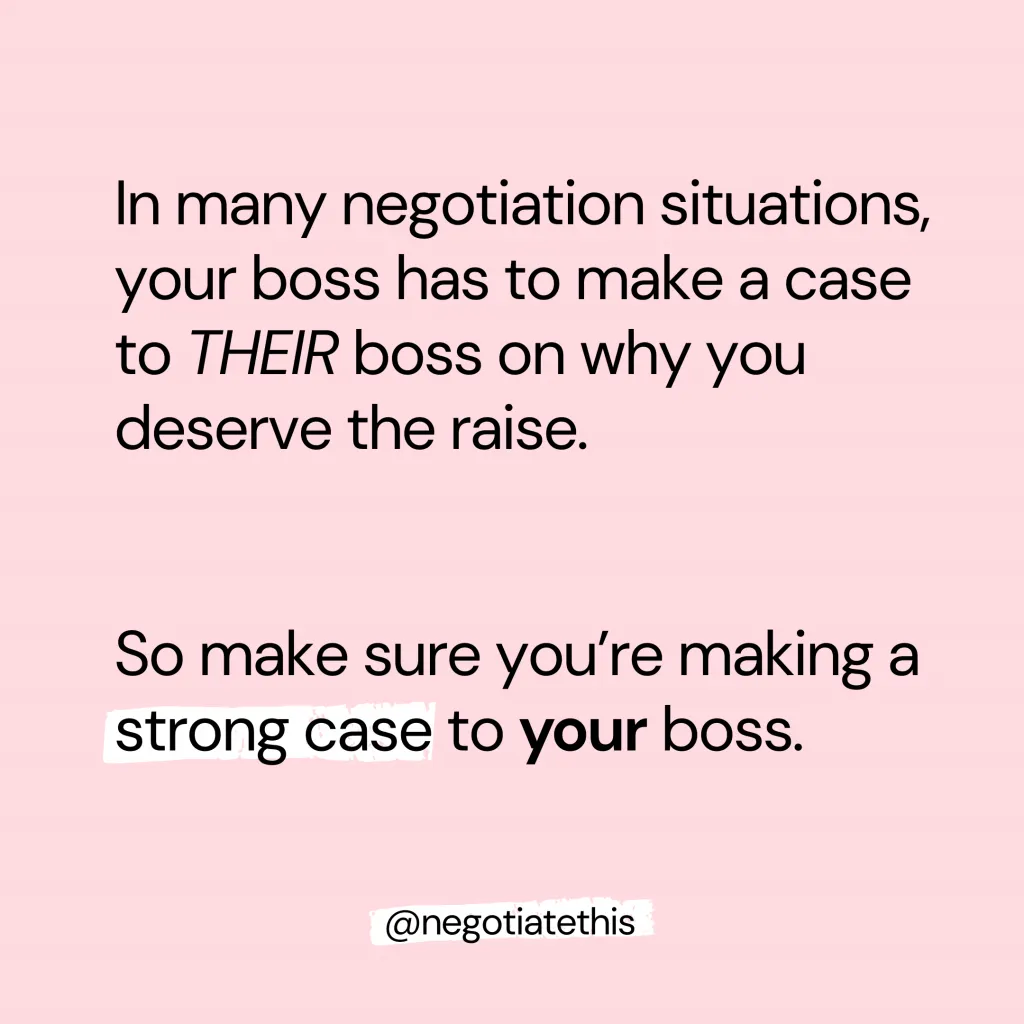
But likely it’s because they’re very busy, too. They also have many metrics, deadlines, & people to respond to just like you.
Make their job easier (and your life better) by letting them know your accomplishments. Share your accomplishments with them to benefit you both. After all, a win for you is a win for your boss.
Tips to Share Your Work Accomplishments
- Create an ongoing list to easily catalog & share your accomplishments
- Regularly share your accomplishments
- Align your accomplishments with the company’s goals
- Solicit support by sharing your accomplishments (& challenges)
1. Create an ongoing list to easily catalog & share your accomplishments
The easiest way to make sure you talk about all your accomplishments (or work wins as we call them around here), is to make sure that you are writing them down and adding them to a list on an ongoing basis. This will make it easier for you to share your accomplishments (because you’ll remember them all!).
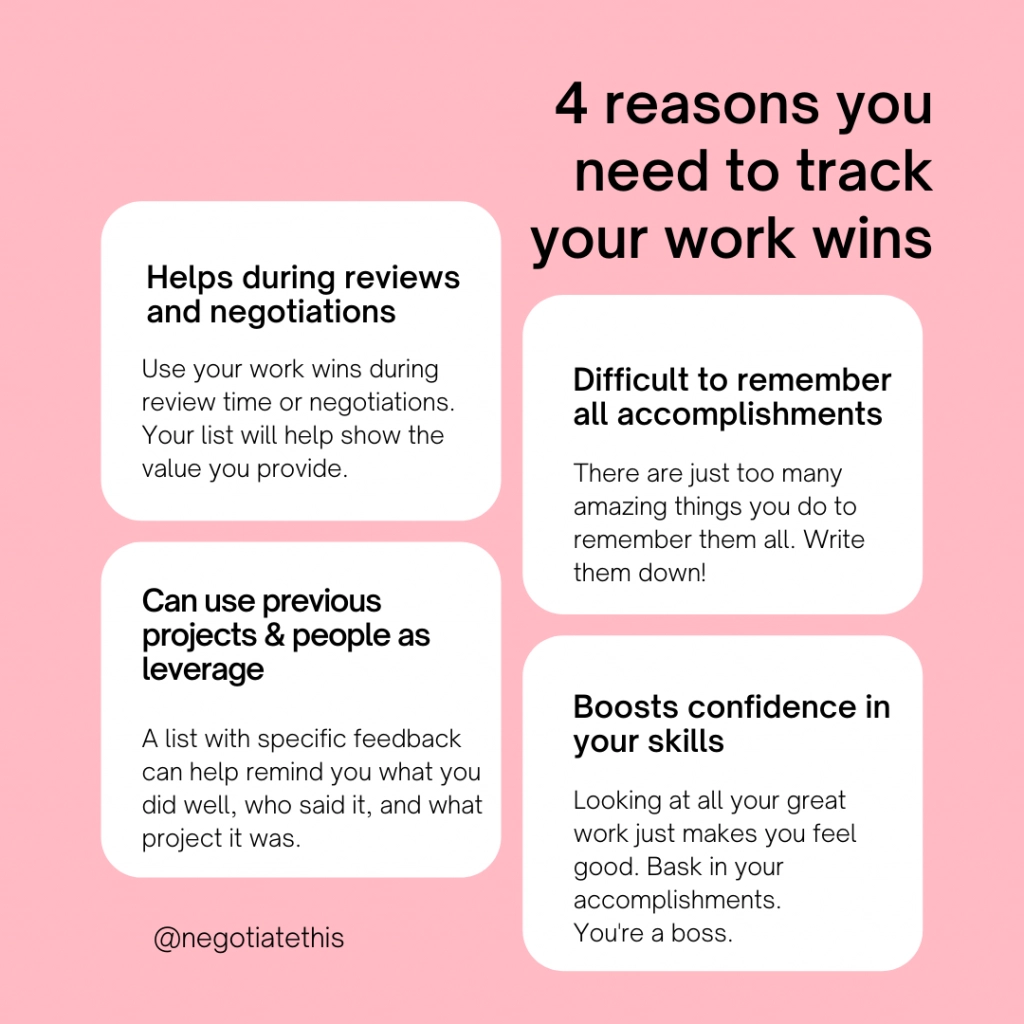
You won’t remember all the amazing things at work you do. Trust me. It’s too many items for you to remember. You have to write them down. Write down the big items and the small items. Write down a great compliment from a client. Add to the list a project you aced. It all counts.
Keep track of your accomplishments in a word document, excel, a note on your phone, in a saved folder in your email – wherever is best for you.
Check out the article 4 Reasons You Need to Track Your Work Wins & How They Help You Do Better In A Negotiation.
In the article, find out why work wins or tracking your work accomplishments helps you in your career:
Why Track My Work Wins?
- 1. Helps during reviews and negotiations
- 2. Difficult to remember all accomplishments
- 3. Can use previous people and projects as leverage
- 4. Boosts confidence in your skills
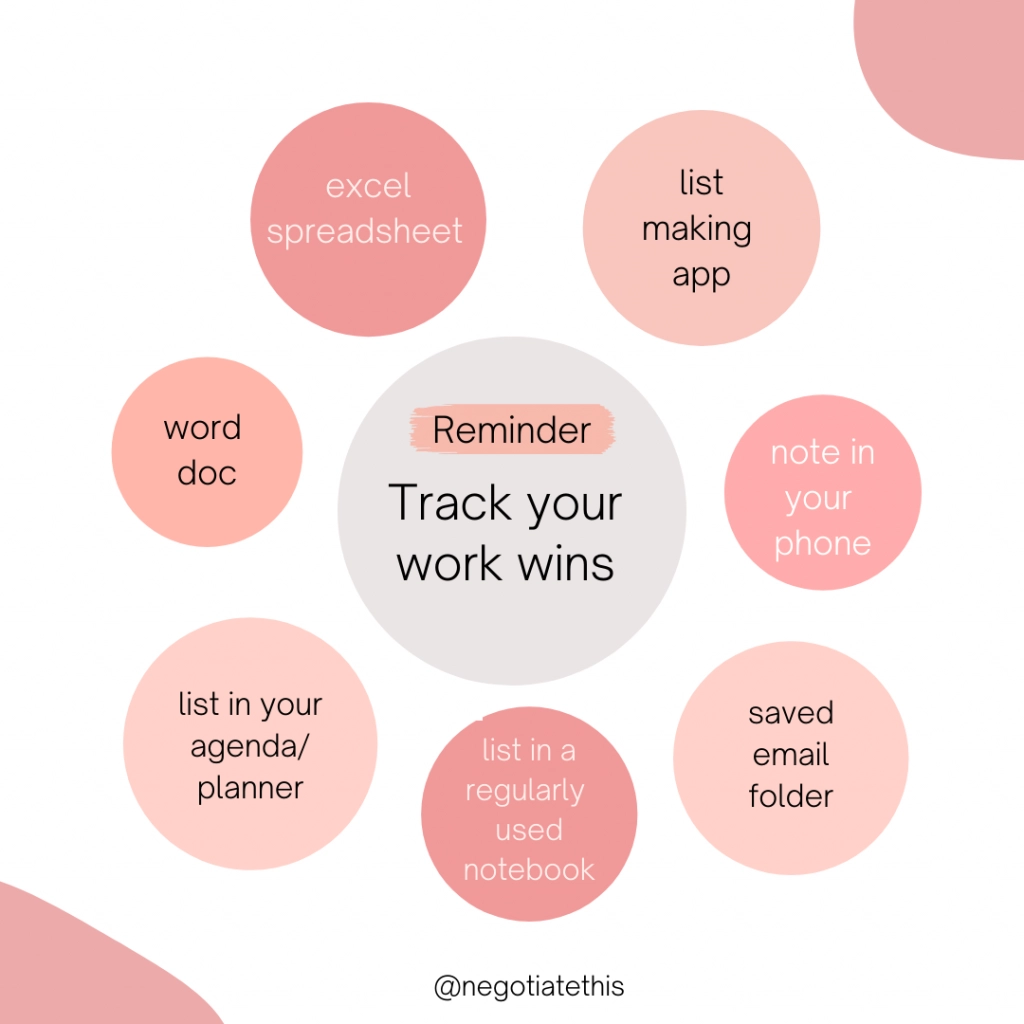
2. Regularly share your accomplishments
Now that you’re on board with keeping track of your work accomplishments, you need to share them. Regularly. Often. And ongoing.
If you wait until the end of the year at your yearly performance review, or even the quarterly one, it may feel like a lot of information for your boss to take in at once. If this is done on an ongoing basis, potentially in a 1:1 meeting, a weekly or biweekly work email recap (things you’re working on & things you’ve had success with for example), or through another medium, make sure this is happening consistently.
Consistency is key.
Remember that you are your own best advocate. You have to regularly share your accomplishments. It can feel hard and cringey. But, get over it. Start small and then keep going. An accomplishment for you is an accomplishment for your boss. And if it’s not, some larger issues are taking place.
For many people, sharing feels hard and egotistical. For some (most of whom have historically been at the top), this can be true. For the rest of us – it’s not true. We need to speak up and do it often about all we are doing. You speaking up and sharing your accomplishments reminds everyone why you’re there and how valuable you are.
3. Align your accomplishments with the company’s goals
What are the strategic goals of the company? What is the company focusing on most right now? Where is it looking to improve? What gaps do you help fill? What are its biggest challenges? How do you help reduce those challenges?
What you do in your company is important to the overall goals, metrics & outcomes. Explicitly spell this out. Connect the strategic goals to your personal performance.
How do the projects you work on add value? What specific strategic outcome does it improve?
Demonstrate how you are an invaluable asset on the regular (don’t just have these conversations once or twice a year – make them frequent).
4. Solicit support by sharing your accomplishments (& challenges)
This item is often overlooked within negotiation and career development, but your boss is your advocate. You have a relationship with your boss and that relationship can really help you not only in your job, but in your career.
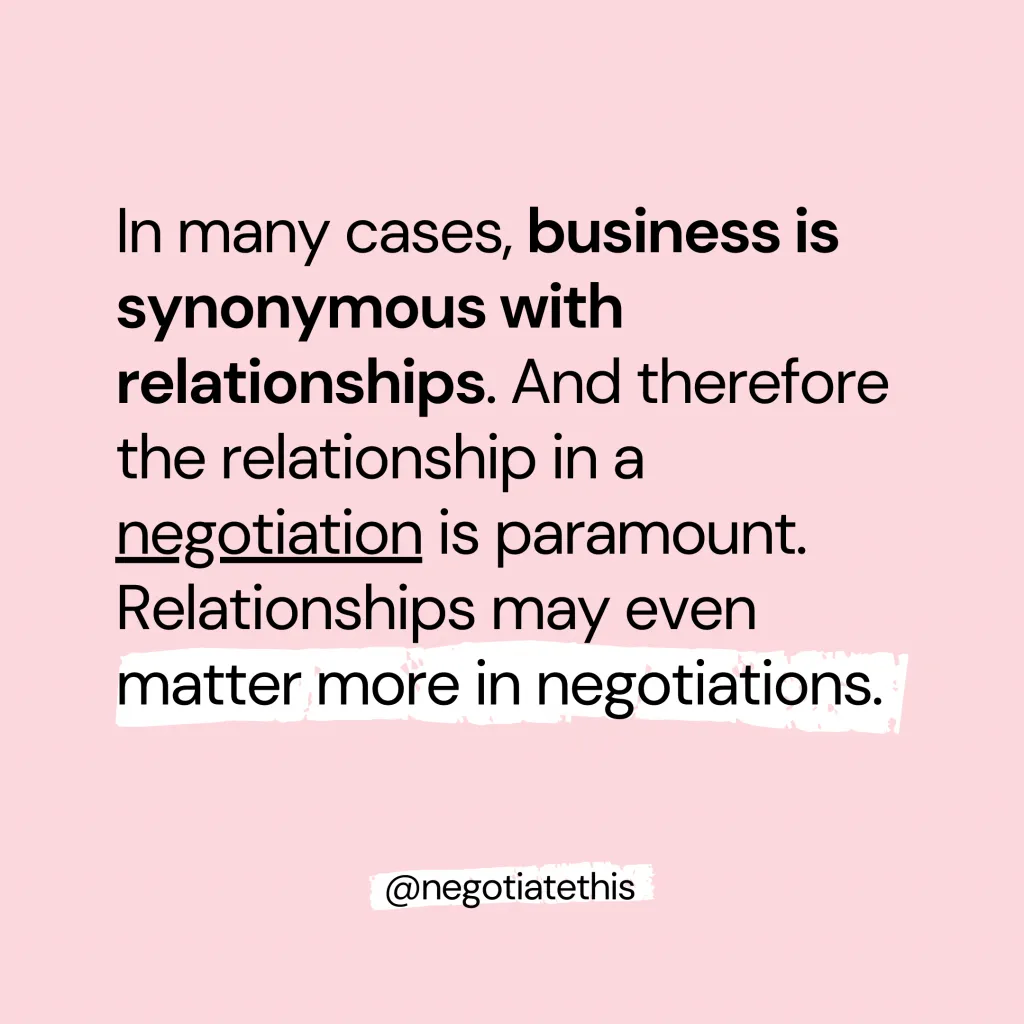
That’s not always the case (and people typically move on from those positions because a bad boss means a bad work life), but many times bosses want the best for their employees.
A typical work relationship with your boss is where they support you and help you meet the expectations and goals of your specific position that align with company goals and metrics. (Read more about why relationships matter at work in the post 3 Important Reasons Why Relationships Matter in Negotiations)
Their role is more than that though, and many companies are beginning to realize this more and more everyday. Your boss should be your coach and cheerleader. They are there to support not only you in your position, but your overall career development.
Let them know your accomplishments (so they know what great work you do) and your challenges so they can help you work through them and hopefully make your work life easier.

How Do I Share My Accomplishments?
How do you share accomplishments? This is a common question. Oftentimes, we worry if we are overly boasting or like we are bragging if we share a success. We worry we are not being humble enough about the work we do.
You may even pass it off as a “team accomplishment” even though it is primarily (and solely) your own. Don’t do that. Do not pass off your success as a team success to seem like a team player. Own your hard work and the accomplishments that come from it.
Keep in mind that your success is their success (your boss’s & the company’s). If you find yourself in a situation where your boss doesn’t recognize that, that’s a red flag and can be a good sign about how long you want to stay in that position.
Tips to Share Your Accomplishments & Challenges
Tips to share your accomplishments & challenges: Stay true to you and your style. You don’t have to do something that is extremely out of your comfort zone. But you likely have to get out of your comfort zone at least a little bit. Starting small will allow you to share in bigger ways later on.
Ways to Share:
- Send a weekly email recap of successes & what you’re working on with your boss
- Bring up in a small-talk conversation a success with a client (to your boss)
- Align a consistent meeting to share about successes (and challenges) so you can speak candidly, typically a 1:1 meeting
- Have a close colleague share one of your wins & you share one of theirs (potentially in a team meeting setting)
*Your work wins are their work wins, and if they don’t see that, have a conversation about it. If that doesn’t help, it could be a sign to begin to make other arrangements.
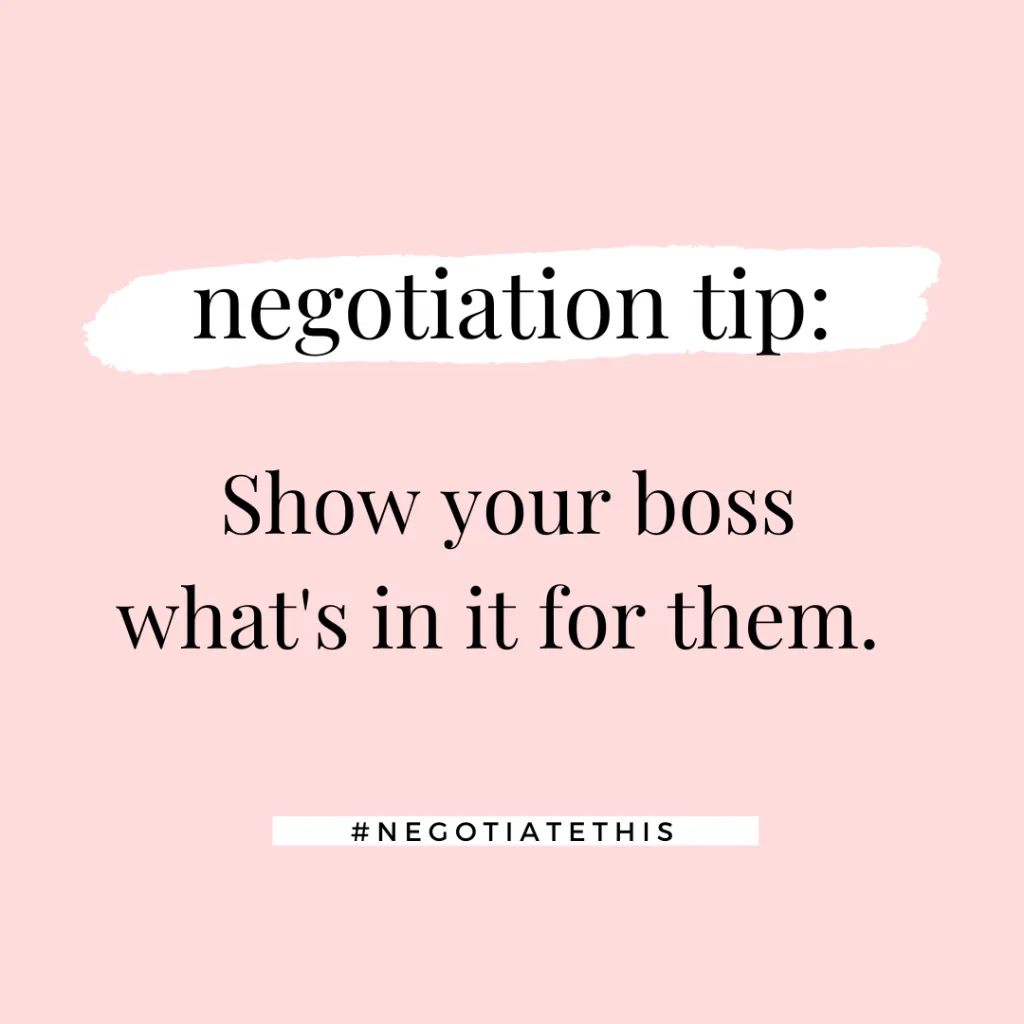
Historically Disadvantaged and Underrepresented Have Hardest Time Sharing Work Success
Those that have been historically disadvantaged and underrepresented in the workplace usually have the hardest time sharing work success. They are also the people who likely need to be sharing successes the most.
Do not worry that you are coming off as boastful. Likely you are not. Your success sharing is oftentimes much more infrequent than those who have a historical advantage in the workplace who are doing it more often.
So go off and share so they know how lucky they are to have you working there.
Best Bosses Support Overall Career Development
The best bosses help you work on your overall career development. But they can only do that if you share where you want your career to go. Sharing what skills, roles and trajectory you want to focus on can greatly help this process.
Share Your Challenges
Share what’s hard for me to my boss… but won’t that impact my performance review?
This is a common & valid question. Assess your unique situation to see how / if this will benefit you. Many times sharing your challenges can be helpful to you in multiple ways. Oftentimes we create scenarios in our head and these types of conversations go better than we think*.
First, it can candidly let your boss know what you’re working on & what is impacting that work getting done. In many cases, your boss can help remove roadblocks that come up for you or point you in the direction of who to consult or where to find the answer. At the very least, it will be an open perspective of what you are dealing with so they understand how to serve you better.
*There are certain circumstances where employees feel unsafe to share this information & that is valid and should not be reduced to “making it up in your ahead”. Always assess your unique situation to see what / if specific advice applies.
Helpful Tips When Sharing A Challenge
When sharing a challenge, it can be beneficial to share ways you’ve worked to solve this issue on your own. Having ideas for a resolution can be another helpful point of topic when bringing up challenges.
If you have a boss with the servant leadership style, sharing your challenges is key as they will work hard to support and remove your challenges. Even if you don’t necessarily have this type of boss, knowing what issues come up for you can give them insight even if they can’t solve it immediately. It could be a topic that is ongoing that slowly gets resolved.

This is also clear communication. If your boss doesn’t respond to your challenges in an adequate way, at least you will have voiced them and they won’t be surprised if you decide to leave.
It Can Be Intimidating
It can be intimidating to share, especially challenges or future career goals. Even sharing success can be intimidating. Understandable. You were hired for a specific role to complete a specific job.
But remember your boss is human too and they will typically understand that you will (likely) move on in the future and not be in this role for the rest of your life. Many will understand that you have career aspirations beyond this role. As soon as you are ready to share what that future looks like, the sooner they can assist in where you want to go and be an advocate for you.
Not All Bosses
It should be noted that not all bosses have the same career-growth mindset. Some bosses want a specific person for a specific reason and their own short-sighted goals within the company are all they can see.
These types of bosses are arguably becoming fewer and fewer (likely because they can’t keep employees ), but if you do have one of these bosses, navigating these conversations will be different. Always assess your own unique situation to make the best decision for you.
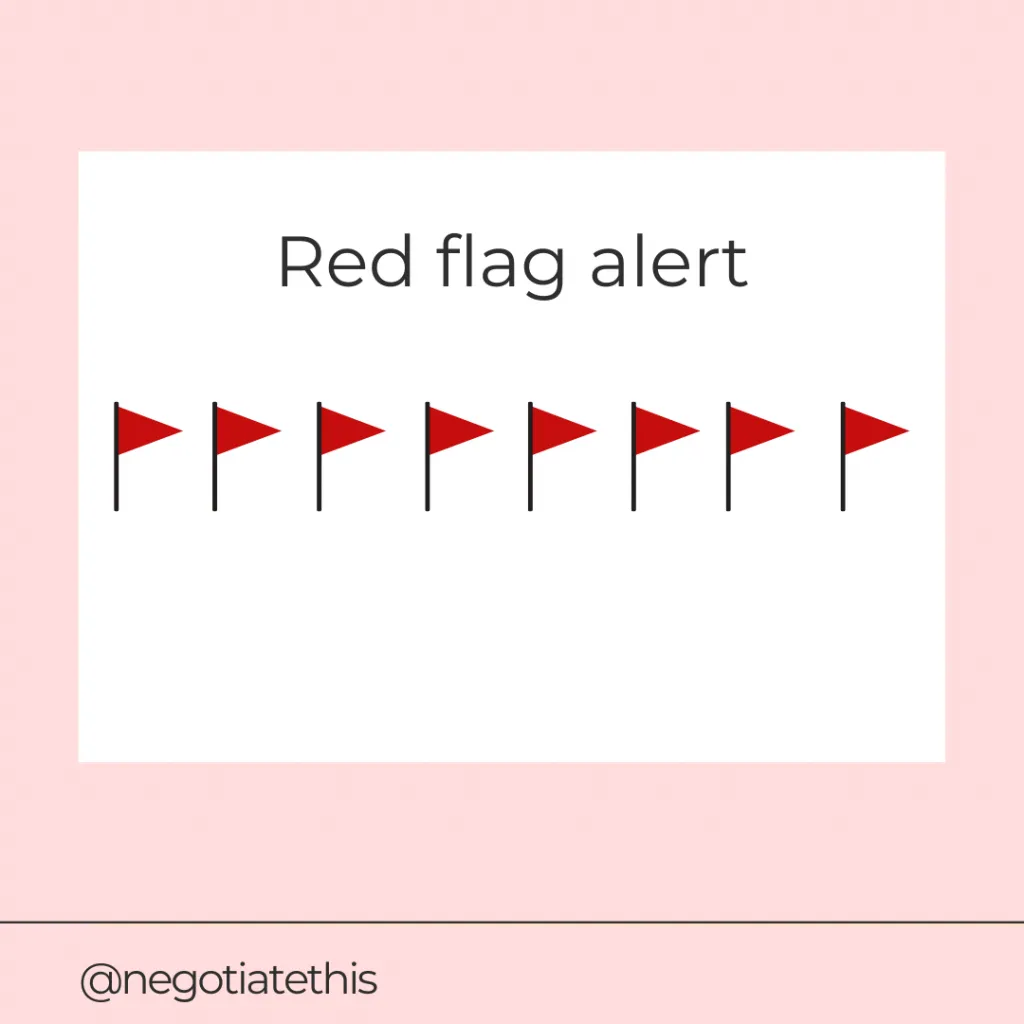
Potential Red Flags
Some potential red flags to observe if the conversation is not going in a positive or productive direction are from expert Nedra Tawwab from her post: “Reasons You May Find It Hard To Talk To Some People“.
Here are some reasons that may apply:
- “They may become defensive”
- “They make everything about them”
- “They aren’t good listeners”
- “They tell you what to do instead of listening”
- “They give bad advice”
- “They become combative”
- “They assume they know what’s best”
– Nedra Tawwab
These can be signs it’s not a safe space to share.
If you find yourself running into these roadblocks while talking with your boss, it may be best to end the conversation and figure out next steps.
Share Your Accomplishments To Advance Your Career
At the end of the day, you want to share your accomplishments so you can get to where you want to go. Being open and honest can help this process. Be brave and speak up for all the hard work you do.
You got this.
Sources
*Author: Nedra Tawwab @nedratawwab, NYT Bestselling Author, Relationship & Boundaries Expert
Post: “Reasons You May Find It Hard To Talk To Some People“
Site: https://www.nedratawwab.com
Disclaimer: While the contents of this post and blog come from research and personal experience, each experience, situation and/or person has their own unique circumstances. This is not negotiation, financial or any other form of legitimate or official advice from an expert. Each individual should do their own independent, comprehensive research. Negotiation, career and all other decisions are the sole responsibility of each individual or party. Details found on the blog and in individual posts are opinions and should be treated as such for entertainment purposes only. Read further disclaimer information on the Disclaimer page.
